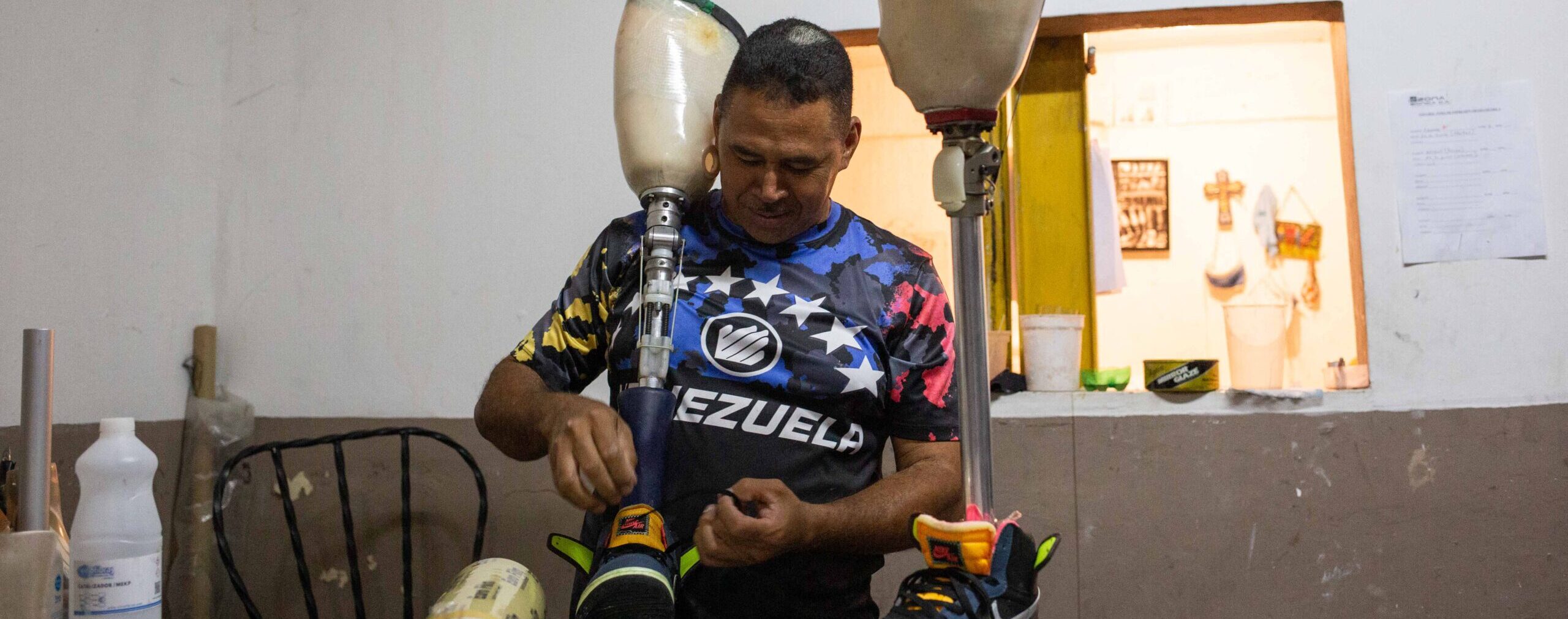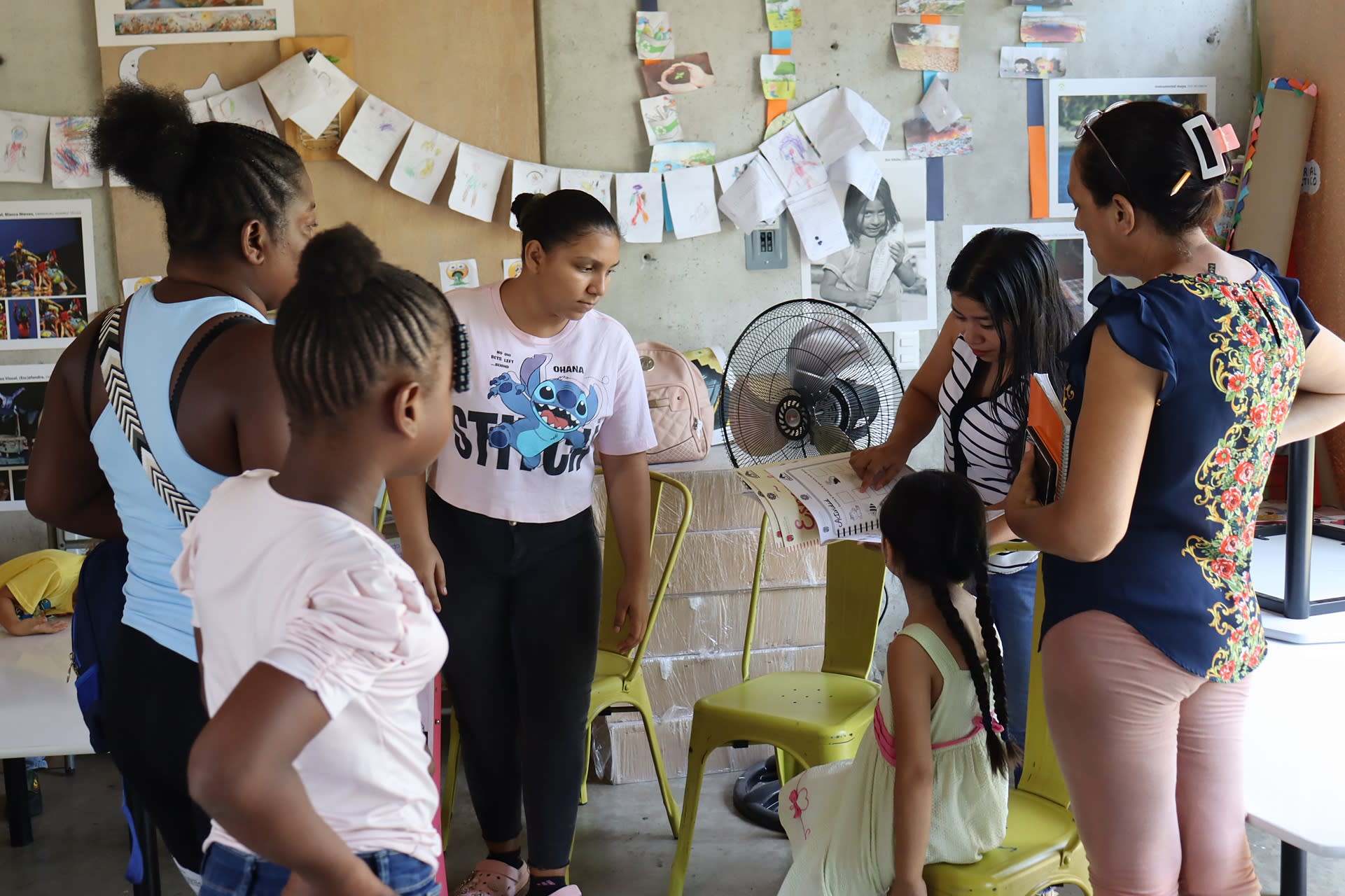International
Prosthetics craftsmen hope to ‘repair humans’ in ailing Venezuela

AFP
“I used to repair car tires. Now I repair humans,” boasts Jose Bastidas, an amputee who left his auto repair job to make artificial limbs in Venezuela, where the health system has all but collapsed.
“Getting someone to walk is priceless,” the 41-year-old told AFP at the Zona Bionica workshop in Caracas.
Bastidas joined the company as a trainee prosthetics manufacturer seven years ago after losing his right leg in a road accident.
“I don’t earn much,” he said, “but it is thrilling to see people stand up.”
There are no statistics on the number of amputees in Venezuela, a country of 30 million people, where three out of four live in extreme poverty, according to a recent study.
The latest data, from 2008, showed that 130,000 people in Venezuela had a physical disability that affects mobility, including amputees.
Zona Bionica says the majority of its clients lost a limb due to a medical problem, such as diabetes, or traffic accidents.
Besides the physical and emotional shock, survivors also have to contend with the cost.
Except for a lucky few beneficiaries of philanthropy, most have to pay all or most of the $1,800 price for the cheapest prosthesis, which needs to be replaced every two years.
The average salary in Venezuela, battered by recession and hyperinflation, is about $50 per month.
– ‘We lost a body part, not our lives’ –
Heidy Garcia, 30, works in the back office of Zona Bionica, which also runs sponsorship campaigns for amputees in need.
Garcia lost her right leg due to a blood circulation problem four years ago, and proudly displays a personalized turquoise replacement limb under short pants.
“It is very hard at first,” said Garcia, referring to phantom pain, cramps and having to get used to attaching the prosthesis, which she managed to acquire through a crowd-funding campaign.
“But you have to keep going and to accept. The mind is very strong.”
Garcia said the fact that most of Zona Bionica’s workers are amputees brings comfort to new patients.
“I encourage them. They get depressed, they have low morale, but we remind them that we lost a body part, not our lives,” Bastidas said.
Cristhian Sequera Quintana, who had both legs amputated after a motorcycle accident in 2015, said that at first, “I did not really want to live.”
“I needed help to bathe, to answer the call of nature,” the 34-year-old told AFP.
But with the prosthesis, “things changed,” said Quintana.
“Now I want to work and live. I want to continue fighting for myself, my son and my family.”
Central America
Trump Administration Asks Supreme Court to Block Return of Deported Salvadoran

The Trump administration on Monday asked the U.S. Supreme Court to block a lower court order requiring the return of a Salvadoran migrant who was mistakenly sent to a maximum-security prison in El Salvador, despite having legal protection from deportation.
The U.S. government has until Monday to bring Kilmer Armado Ábrego García back to the United States, as ordered by Judge Paula Xinis in a Maryland court.
According to The Washington Post, the administration argues it lacks authority to comply because Ábrego García is currently in Salvadoran custody.
The U.S. had appealed Judge Xinis’ ruling to the Fourth Circuit Court of Appeals, but the court declined to act immediately—prompting the administration to take the case to the Supreme Court. In its filing, the government stated that “the Constitution entrusts the President, not federal district courts, with the conduct of foreign diplomacy and the protection of the nation from foreign terrorists, including through deportation.”
Ábrego García, a resident of Prince George’s County, Maryland, and married to a U.S. citizen, came under scrutiny in 2019 after an informant claimed he was a member of the MS-13 gang (Mara Salvatrucha).
Although he was initially slated for deportation, a judge later granted him a stay of removal after he requested asylum, according to the lawsuit.
Nevertheless, U.S. Immigration and Customs Enforcement (ICE) detained him on March 12, claiming his status had changed, and sent him to a detention center in Texas.
International
Teachers in Southern Mexico Bring Education to Stranded Migrant Children

Teachers in southern Mexico have created a program to provide classes for migrant children stranded in the region, following a year-over-year increase of over 70% in irregular migration among minors—many of whom lose months or even years of education during their journey toward North America.
In Tapachula, the largest Mexican city bordering Central America, three teachers offer preschool, elementary, and secondary education through the Chiapas State Migrant Education Program (Pemch).
This initiative has been replicated in key municipalities across Chiapas, including San Cristóbal de Las Casas, the capital Tuxtla Gutiérrez, Palenque, Comitán, and other border towns. Currently, there are around 1,345 migrant students and a total of 35 teachers working across farms and shelters.
Pablo Arriaga Velázquez, a teacher with the migrant education program in Tapachula, told EFE that the project was born in response to the large number of migrant minors, as enrolling them in regular schools is often difficult.
Central America
Mulino and Orsi Highlight Shared Vision After Panama Joins Mercosur as Associate State

The Presidents of Panama, José Raúl Mulino, and Uruguay, Yamandú Orsi, highlighted on Monday the path of integration both countries have undertaken in areas such as trade and the defense of democracy, following a meeting held at the Panamanian government headquarters.
In a brief statement to the press, both leaders emphasized that Panama and Uruguay share many values and are working together across different sectors. They also underlined a renewed connection following Panama’s accession last December to the Southern Common Market (Mercosur) as an Associated State.
“Panama has begun a new era of looking southward, seeking opportunities not only for work, business, and friendship, but also for regional integration in a positive sense. Today, I believe we have taken a decisive step in that direction,” said President Mulino.
The Panamanian leader stressed that his country and Uruguay “have much in common” and share “important values in terms of democracy, respect for institutions, and the rule of law—principles that must always be strengthened, no matter how much effort it takes.”
-

 Internacionales2 days ago
Internacionales2 days agoErik Prince Backs Ecuador’s Daniel Noboa in Fight Against Crime and “Narcoterrorism”
-

 Central America4 days ago
Central America4 days agoPanama’s former president Martinelli claims political enemies tried to kill him
-

 Central America2 days ago
Central America2 days agoGuatemala’s Legal Chief Shot Dead in Parking Lot: Investigation Underway
-

 International4 days ago
International4 days agoJavier Milei vows to work ‘side by side’ with the U.S. on trade rules
-

 Central America21 hours ago
Central America21 hours agoHonduras Hosts CELAC Summit Amid Regional Concern Over U.S. Deportations
-

 International21 hours ago
International21 hours agoTeachers in Southern Mexico Bring Education to Stranded Migrant Children
-

 Central America21 hours ago
Central America21 hours agoTrump Administration Asks Supreme Court to Block Return of Deported Salvadoran
-

 Central America21 hours ago
Central America21 hours agoMulino and Orsi Highlight Shared Vision After Panama Joins Mercosur as Associate State















